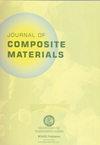预固化对热塑性塑料-热固性塑料相间性的影响
IF 2.4
3区 材料科学
Q3 MATERIALS SCIENCE, COMPOSITES
引用次数: 0
摘要
本研究考虑了热塑性塑料和热固性塑料层压板之间通过界面相互扩散产生的粘合力。研究通过机械测试和显微镜检查了热固性塑料在工艺开始时固化程度的影响。提高初始固化度会降低层间断裂韧性和相间厚度。断裂韧性的降低与相间厚度不成比例,这归因于相间形态的变化和界面表面接触的减少。利用凝胶体层厚度测量数据建立了一个简化模型,以预测随着初始固化度的增加,相互扩散的程度。与热固性-热固性共固化相比,低初始固化度下的粘接强度更佳,而且预测对初始固化度的敏感性更高,这表明工艺变异的影响更大。因此,对于特定的关键性能应用,如何权衡半固化可能带来的生产效率提高和性能降低是一个重要的考虑因素。本文章由计算机程序翻译,如有差异,请以英文原文为准。
Effect of pre-curing on thermoplastic-thermoset interphases
This study considered adhesion between thermoplastic and thermoset laminates through interdiffusion at the interface. The influence of the degree of cure of the thermoset at the start of the process was investigated through mechanical testing and microscopy. Increasing the initial degree of cure decreased both interlaminar fracture toughness and interphase thickness. Fracture toughness decreased disproportionately to interphase thickness, attributed to changes in interphase morphology and decreasing surface contact at the interface. A simplified model was developed using gel layer thickness measurement data to predict the level of interdiffusion with increasing initial degree of cure. Compared to thermoset-thermoset co-curing, there was superior bond strength at low initial degrees of cure and a predicted increased sensitivity to the initial degree of cure, suggesting a greater influence of process variability. Hence, for specific property critical applications, the trade-off between the potential manufacturing efficiency gains from semi-curing and the reduced performance would be an important consideration.
求助全文
通过发布文献求助,成功后即可免费获取论文全文。
去求助
来源期刊

Journal of Composite Materials
工程技术-材料科学:复合
CiteScore
5.40
自引率
6.90%
发文量
274
审稿时长
6.8 months
期刊介绍:
Consistently ranked in the top 10 of the Thomson Scientific JCR, the Journal of Composite Materials publishes peer reviewed, original research papers from internationally renowned composite materials specialists from industry, universities and research organizations, featuring new advances in materials, processing, design, analysis, testing, performance and applications. This journal is a member of the Committee on Publication Ethics (COPE).
 求助内容:
求助内容: 应助结果提醒方式:
应助结果提醒方式:


